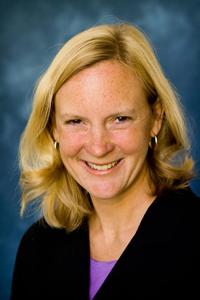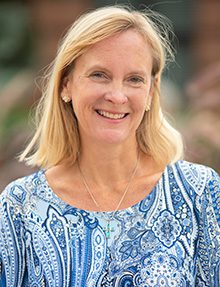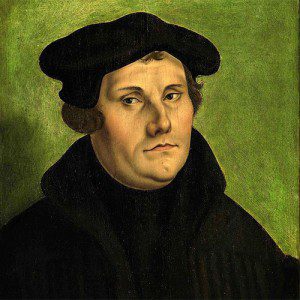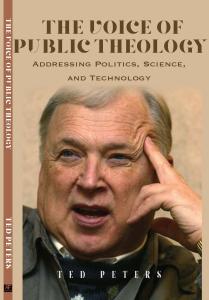The Public Theology of Jennifer Hockenbery
Editor, The Journal of Lutheran Ethics
Patheos PT 5012
Like putting a good book down and then picking it up again to continue reading, it is the bookmark that guides you to the right page. The world’s ongoing story needs the ethicist to put us on the right page.

One priceless contribution the public theologian can offer to our emerging planetary society is solid, transparent, nuanced, critical, and charitable ethical thinking. Whether the contemporary world wants ethics or not, it certainly needs it. The public theologian can contribute perspicacious moral deliberation to the common good.
It is the thinking out loud that may be of greatest value to the public beyond the church. Gone are the days of ecclesial authority. In the rag-tag competition between ideas in the media, high-minded ethical ideals must be intrinsically persuasive to get a hearing.
Lutheran ethicist Jennifer Hockenbery suggests that the discussion may be more critical than the conclusion.
Whether the discussion is on climate change, immigration, women’s rights, or general politics, the discussion is critical. I believe, we cannot afford to say we are wisest because we know we do not know. We cannot afford to be dogmatic and push forward an agenda that might destroy us. We must have humble dialogue that leads to constructive solutions. And while our Lutheran theology declares that we, with reason alone, will certainly not save ourselves, our Lutheran theology also demands that we find ways to lovingly serve our neighbor.
In what follows I plan to affirm that one of the gifts of the public theologian to the wider public is sapient moral deliberation. This is the public theologian’s prophetic or ethical task.
If you want more resources on Public Theology, click here.
Public Theology in the Form of Social Statements
In this Patheos series, I have been describing public theology as conceived in the church, critically refined in the academy, and offered to the wider culture for the sake of the global common good. With this description in mind, one can only congratulate North American Lutherans for advancing public theology at its very best. One distinctive form that this public theology takes is the Social Statement.
The Evangelical Lutheran Church in America (ELCA) along with its predecessor bodies has refined the job of crafting social statements to a fine art. In each case, the best scholars are assembled and asked to provide analysis of a designated social crisis or irresolvable issue. Then, resources are brought to bear for understanding the issue from Holy Scripture, tradition, reason—usually in the form of philosophical ethics—and, of course, contemporary experience. [1] Then, judiciously, the social statement task force formulates transparent recommendations to be taken up both within the church and by the wider society.
Here is the self-imposed mandate. “This church shall develop social statements … that will guide the life of this church as an institution and inform the conscience of its members in the spirit of Christian liberty.”
Like a pirate’s treasure, the ELCA website provides a strong box of gems gleaming with erudition and wholesome thinking on racial justice, corporate social responsibility, abortion, caring for creation, genetics, human sexuality, and, of course, peace.
“Christians are committed to society for the sake of all,” we find in the statement on Church and Society. There is more. “And, this means they [Christians] must be ready to speak for change.” The first step in ethical deliberation, in my opinion, is to envision a way in the world can become a better place and then, secondly, design a way to get there from here.
For resources, Lutherans rely on scripture, tradition, reason and experience. Measured by these criteria, the only rival to Lutheran ethics is Roman Catholic moral deliberation. In fact, if you read closely, you’ll see that the Lutherans sometimes steal great Roman Catholic insights such as appeal to the common good.[2] The compassion of the heart and zeal for social justice are shared by these two traditions. And, of course, by compassionate Christians worldwide.
In sum, for consistent insightful public theology, follow the offerings of Lutheran Social Statements (along with Roman Catholic moral theology). If you think I’m bragging about my own church’s accomplishments, please indulge me. Thank you.
The Journal of Lutheran Ethics (JLE)
The Journal of Lutheran Ethics or JLE extends this fine tradition of social commentary, addressing new issues of social concern bimonthly. It’s editor is Jennifer Hockenbery.
Before turning to my interview with Dr. Hockenbery, let me mention one other prominent resource for public theology, namely, Dialog, A Journal of Theology, currently edited by Kristen Johnston Largen and Whitney Bauman. Dialog was founded in 1960 by maverick Lutherans—Carl Braaten, Robert Jenson, and others—who, a generation ahead of their time, employed a “theology of culture” to gain leverage on offering distinctively theological takes on current events and cultural trends.
Meet Jennifer Hockenbery
Jennifer Hockenbery Dragseth serves as Editor of the online Journal of Lutheran Ethics. This journal is published for free public access, sponsored by the

Evangelical Lutheran Church in America (ELCA). Appearing online here are pertinent and pungent articles by perceptive scholars in the Lutheran tradition and other traditions as well.
Dr. Hockenbery is also Dean of Humanities and Professor of Philosophy at St Norbert College in De Pere, Wisconsin. A philosopher interested especially in Luther Studies, Saint Augustine, and Feminism, she is the author of Wisdom’s Friendly Heart: Augustinian Hope for Skeptics and Conspiracy Theorists (Cascade, 2020) and Thinking Woman: A Philosophical Approach to the Quandary of Gender (Cascade, 2015). Dr. Hockenbery has also edited The Devil’s Whore: Reason and Philosophy in the Lutheran Tradition (Fortress 2011) plus Just in Time: Moments in Teaching Philosophy (Pickwick 2019). She attends Grace Lutheran Church in Green Bay, WI.
- What is your editorial vision for the Journal of Lutheran Ethics? How do you connect the church, the academy, and the wider public?
JH. I first learned about the existence of the Journal of Lutheran Ethics when a colleague sent me the notice that the advisory committee was looking for a new editor. As an active ELCA church member, a scholar of Luther Studies, a professor of philosophy, and a passionate advocate for Lutheran perspectives in the academy, I was surprised and a little ashamed that I had not found JLE on my own.
Lutherans in the Church
JH. Unfortunately, I still meet people in ELCA churches, in Lutheran colleges, and in broader Lutheran academic circles who do not know of the Journal. Thus, a great hope for my leadership for JLE is to broaden its audience both in the church and in the academy that they might enrich and be enriched by a broader discussion of faith and works of love.

This is important because it is crucial that members of the church and participants in the academy engage together in faithful and intellectual dialogue on pragmatic ethics. On one hand, critical and creative thinking is a key part of the role of the church. Pastors, adult education leaders, and church council members are constantly thinking about and dialoging about social and ethical issues concerning race, sexuality, gender identity, economic disparity, justice, poverty, homelessness, gun violence, abortion, voting rights, health care, and the very possibility of constructive dialogue on these issues given current political divisiveness. This is right for, true faith is active in works of love.
Lutherans in the Academy
JH. On the other hand, faithful, prayerful, contemplation is a key part of the role of the Lutheran academy. The Lutheran academy is especially active in ELCA colleges, universities, and seminaries but also in the offices and classrooms of Lutheran academics that teach in institutions guided by other denominations and faith perspectives and in those that are secular in nature. The lens through which Lutheran academics do their thinking is formed by the faith that is nurtured in the churches and in their prayer-life. Their works of love are grounded in their faith.
JLE was created to form a space for connection between the church, the academy, and the public in order that those who work, pray, and live in these spaces might have a place to think together.
Today, JLE serves as a library of resources that contain practical and theoretical articles for all those broadly interested in issues of ethics who are hoping to find helpful answers to the existential questions “What ought I do?” and “What can I do?” The Journal has a new website that makes more accessible this extensive on-line library of articles written by Lutherans (and those of other denominations who find this lens important) for Lutherans (and those who want to learn more about the Lutheran perspective) using Lutheran theology as a lens through which constructive thinking emerges. The work of Heather Dean and Denise Rector especially have made this website more easily searchable and more practically useful for all readers.
Lutherans in the Wider Public Culture
JH. The Journal of Lutheran Ethics is, also, a living platform for discussions of new ideas as they are formed in the context of contemporary changes and developments in the wider culture. Making sure that pastors, lay leaders, congregants, professors and students are all part of that discussion is essential. To that end, I aim to try to include diverse authors from all of these pools and encourage many to contribute as they find themselves called to share their data, their thinking, and their questions about ethical issues with the larger Lutheran community and the world beyond the church. On the website, authors can find a call for submissions that clearly explains topics planned for upcoming issues as well as guidelines for writing, citing, and submitting essays.
Finally, another one of my goals as editor and one of the main goals of the advisory council has been to make the Journal of Lutheran Ethics more useable for church leaders and congregants. Specifically, I was asked to create a section in every issue called For Congregational Discussion that sets forward a “lesson plan” for adult education hours. I hope that this section encourages church leaders to invite the laity to read and discuss the articles together regularly.
- What are the core theological and ethical doctrines or resources you wish to bring to pressing social issues?
JH. The core of Lutheran theology is the view that each Christian is justified not by her own works but by the graceful love of God. It is God that gives us our value, we do not and cannot earn it. This constant refrain frames all Lutheran ethical discussion, freeing the believer from laws and guidelines meant to purify the self and prove one’s goodness in order that the believer might focus only on serving the neighbor for the neighbor’s sake alone. Freed from the constant anxiety caused by the desire to save one’s self, the Lutheran ethicist understands that knowing how best to serve one’s neighbor in love requires practical reasoning on issues of ethics.
3. You wrote, Wisdom’s Friendly Heart: Augustinian Hope for Skeptics and Conspiracy Theorists. What wisdom do you offer our planetary society which seems to have lost its center, its capacity to integrate

JH. Most Lutherans know that Martin Luther was an Augustinian monk who believed that his understanding of justification was completely in line with Augustine’s On the Spirit and the Letter. What is sometimes less known is that Luther’s epistemology also came from Augustine—as does the epistemology that is at the center of the Roman Catholic Intellectual Tradition and at the center of many other protestant Christian academic traditions.
This epistemology is grounded in a sincere faith that Christ is the Truth that seeks all those who pursue knowledge with a friendly heart. Christ is the Teacher who makes it possible that when we read words on a page we understand those words that demonstrate to our minds the ideas of another person’s mind, another person who wrote those words. Christ is the Teacher who makes it possible that when I speak, you hear and know my meaning and that when I listen to your words I understand what is in your heart and mind. Christ is in the space of relationship between speaker and listener, between interlocutors, between fierce debaters, between authors and readers, between protestors and police, between media creators and media consumers.
Augustine’s Odyssey
JH. Augustine and Luther both believed this apologetically. That means they defended their faith that Christ is our Teacher using empirical examples, logical force, and rhetorical tact. Of course, they witnessed and experienced plenty of moments in which dialogue failed to bring consensus, debate failed to produce a clear winner, and even friendly conversation turned venomous. But, still they believed that Christ was there, even if as a body torn apart on the cross. For both Augustine and Luther this meant that they never stopped talking, preaching, writing, and encouraging others to do likewise. Even though at times they lost their temper at their interlocutors, their faith persuaded them to keep talking.
This means a lot to me as a professor, an administrator, an editor, a parent, and a citizen. To me it means that I can and should read widely, talk to many different people with diverse perspectives, protest loudly, listen quietly, and never be afraid of keeping the conversation going. I will make missteps in my own speech from time to time, and I will surely hear people with wrong-headed views from time to time. But the conversation can continue without fear because Christ is present in, with, and under our words working in our hearts and minds that we might understand each other better and grow to deeper wisdom together.
Many Voices
JH. I think that a lot of us are afraid that other voices will dissuade us from an opinion we want to believe and so we stop talking to certain other voices. Christ calls us to a stronger faith. The life and works of Augustine is a witness to that faith. Augustine was seduced by worldly honors to take on a profession where he was paid to tell lies to those who knew he was telling lies. Augustine’s own pride led him to join a cult that flattered him as a member of an elite and persuaded him for years from asking difficult questions. And yet, even in those most dangerous circumstances, Augustine was not trapped. In his view, Christ led him to keep asking questions, to keep reading, to keep talking to members of his family, and to keep conversing with others broadly. Christ led him into a church to hear Ambrose preach and to Cassiacum to hear friends talk about the happy life. Christ was in the words of his mother and in the words of his son.

Augustine never felt like he knew the whole Truth and always knew his understanding contained errors. But he believed that the best path was to keep talking to people; even dangerous heretics should be debated not silenced. Because he trusted that Christ was in the words between people, his views formed the foundation of open dialogue and freedom of speech in both the church and the academy after him. If we trust that Christ, who is Wisdom, is on our side, we need not be afraid of any book, speaker, or interlocutor.
I wrote Wisdom’s Friendly Heart as a witness to Augustine’s faithful epistemology that I think is the ground of my own faith. I hope that as people read it they see it as both an apology for that trust in open conversation and an exhortation to talk and listen to others widely.
Conclusion
In our pluralistic global conversation, the church dare not attempt to speak with authority. For the public theologian, then, to make a contribution to the common good, the theologian must lift up an ethical vision which is intelligible, transparently thought through, guileless, and charitable.
Jennifer Hockenbery and the Journal of Lutheran Ethics are clearing that path.
Postscript on Public Theology Series
This introduction of Jennifer Hockenbery is another installment in our series on influential public theologians around the world. Please visit our Public Theology Master Page for a complete list of posts.
We’ve looked at the Drumbeat African Public Theology of Mwaambi G Mbûûi; the treatment of natural science as an agenda item for public theology in Noreen Herzfeld; the international reach of Brazilian theologian Rudolf von Sinner; the “agent church” engagement of “Black Lives Matter” in Valerie Miles-Tribble; the work on behalf of the subaltern in India of Binoy Jacob; the Lutheran insights of Robert Benne; the progressive Christianity of Katie Day; the post-colonial emphasis of Paul Chung; the challenges Beijing poses to Hong Kong in the ministry of Kang Phee Seng; and, of course, numerous pressing social and theoretical issues. The public theologian has both an opportunity and a responsibility to share the sophistication of theological reflection with the wider culture for the sake of the common good.
Rudolf von Sinner would want us to register and attend the Curitiba conference coming up October 3-6, 2022. The main theme: “Public Theologies in Vibrating Cities: Precious and Precarious”. As stated on the Global Network of Public Theology’s website (gnpublictheology.net), the rationale behind the theme is that “Cities vibrate, shine, resonate.”
▓

Ted Peters is a Lutheran pastor and emeritus seminary professor, teaching theology and ethics. He is author of Short Prayers and The Cosmic Self. His one volume systematic theology is now in its 3rd edition, God—The World’s Future (Fortress 2015). His book, God in Cosmic History, traces the rise of the Axial religions 2500 years ago. He has undertaken a thorough examination of the sin-and-grace dialectic in two works, Sin: Radical Evil in Soul and Society (Eerdmans 1994) and Sin Boldly! (Fortress 2015). Watch for his just published book, The Voice of Public Theology (ATF 2023). See his website: TedsTimelyTake.com.
Ted Peters’ fictional series of espionage thrillers features Leona Foxx, a hybrid woman who is both a spy and a parish pastor.
▓
NOTES
[1] The four sources–Scripture, tradition, reason, and experience–constitute the Wesleyan Quadrilateral, revered by the Methodists. Tacitly, virtually every modern theologian relies on this particular quadrilateral.[2] The Lutherans did not steal the “common good” from the Catholics, to be sure. The “common good” is a good these traditions hold in common. According Gaudium et Spes, the common good is “the sum of those conditions of social life which allow social groups and their individual members relatively thorough and ready access to their own fulfillment.” In the ELCA social statement on genetics we find: “Today, the meaning of “common good” or “good of all” must include the community of all living creatures. The meaning also should extend beyond the present to include consideration for the future of the web of life. The sphere of moral consideration is no longer limited to human beings alone.”













